Members of Danielle Murad Waiss’ extended family died in the Holocaust, while others were forced to flee to different parts of the world, including to Mexico, where she was born.
It’s a family history that inspired her over the past year as she researched, directed, and choreographed a seven-piece dance performance for Northeastern’s annual Holocaust Commemoration—each piece inspired by a different poem or song from the Holocaust.
“It’s a very sad history,” said Murad Waiss, SSH’19, “but knowing where my family comes from has always been important to me.”
That performance, which was presented on April 12 during Holocaust Awareness Week at Northeastern, combined crucial parts of her identity—not only her family’s connection to the Holocaust but also her extensive experience as a dancer. She began taking ballet at age 4, is also a contemporary and jazz dancer, and has picked up salsa and ballroom dancing while at Northeastern.
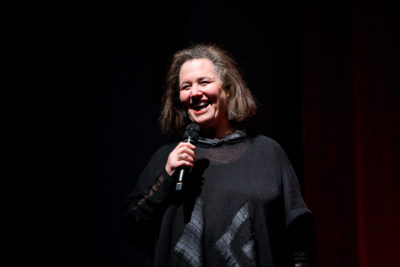
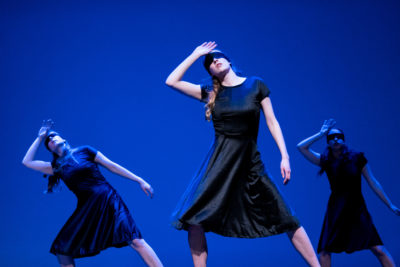
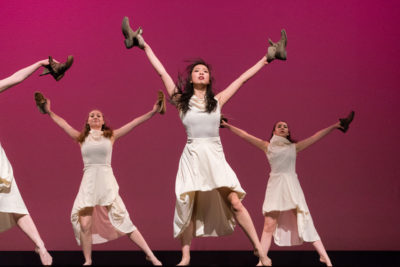
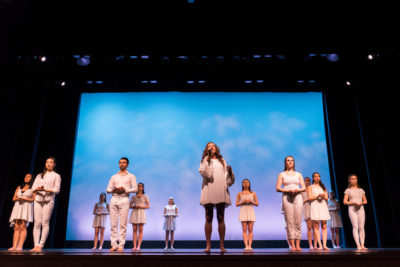
On Monday, Murad Waiss was honored at the university’s Academic Honors Convocation as one of three Presidential Global Fellows, a designation given on the basis of students’ academic standing, leadership qualities, and understanding of the importance of global experience to their education, personal development, and career goals. She previously did an internship at the House of Commons for Mims Davies, a Conservative Party member in the U.K. Parliament, and then did a two-part global co-op—the first working at the NATO Defense College in Rome and the second at the International Institute for Counter Terrorism in Herzliya, Israel. Next, she will spend the majority of the summer on two Dialogue of Civilizations programs, the first at the United Nations in Geneva and the second studying disasters and recovery in Japan.
This year’s Gideon Klein Scholar
In creating her Holocaust Commemoration performance, the fourth-year student sought not only to create a performance that shed light on this dark period in human history, but also show the resilience that allowed people to keep living.
“During the Holocaust, the world witnessed some of the worst horrors we have ever seen,” Murad Waiss said. “Yet, it is remarkable to think that during this terrible time, when everything seemed lost, poetry, art and music continued to be a part of people's lives.”
Murad Waiss, a combined major in political science and international affairs, was awarded the opportunity to create the performance when she was selected as the university’s 2017-18 Gideon Klein Scholar, which supports a student to create an original work, prepare a performance or do research related to art in the Holocaust.
The award honors the memory of Gideon Klein, a brilliant pianist and composer who was imprisoned in concentration camps until his death in 1945. Northeastern Distinguished Professor of Chemistry Bill Giessen, who grew up in Nazi Germany and died in 2010, established the award in 1997 in memory of his mother, Gustel Cormann Giessen.
The performance presented by Murad Waiss —held in Blackman Auditorium—was titled “Nizkor,” which translated from Hebrew means “We Remember” as an invitation to the audience to reflect on what took place and learn from humanity´s mistakes, she said. “Nizkor” featured pieces inspired by poems including Elie Wiesel’s “Never Shall I Forget,” Pavel Friedman’s poem “The Butterfly,” and “Lullaby,” a composition of Klein’s for which she herself danced in the performance, in honor of the 1 million children killed during the Holocaust.
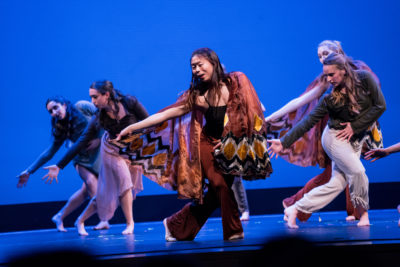
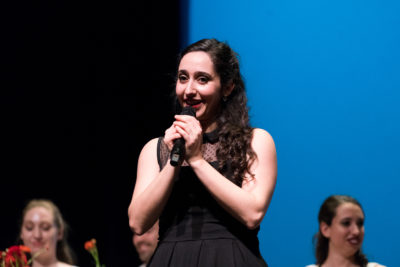
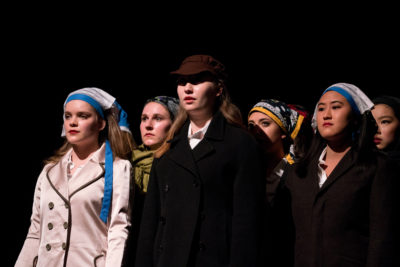
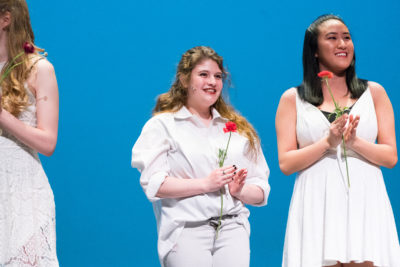
The performance featured 13 dancers—the majority of whom were Northeastern students—as well as four student-actors from Northeastern. In keeping with the personal nature of the project, Murad Waiss included members of her own family. Her cousin, Guidian Shturman, composed about half of the music, and her sister, Ariann Murad Waiss, sang the final song, “Jerusalem of Gold”. Several other family members, including her parents and grandparents, also attended the performance.
“It is our responsibility to keep remembering,” she said. “The people that risked their lives to save individuals did so not because of some grand mission in life, but because they recognized humanity in their neighbors and friends. We seem to be forgetting that in our core all humans want the same thing, and when we remember this humanity and connect to it, we can truly begin to learn from the lessons in our past so that we continue to remember and never forget.”
